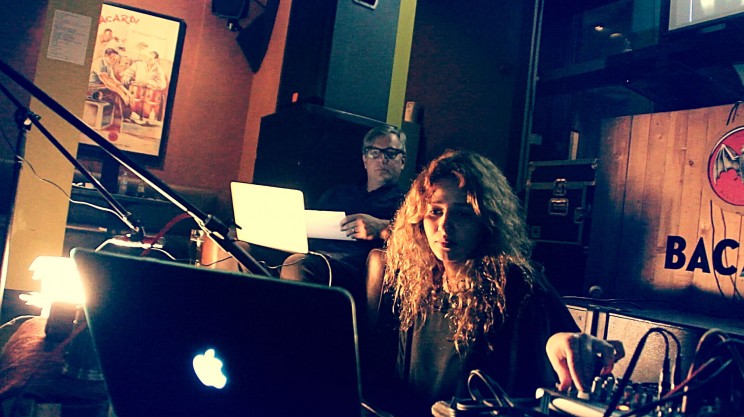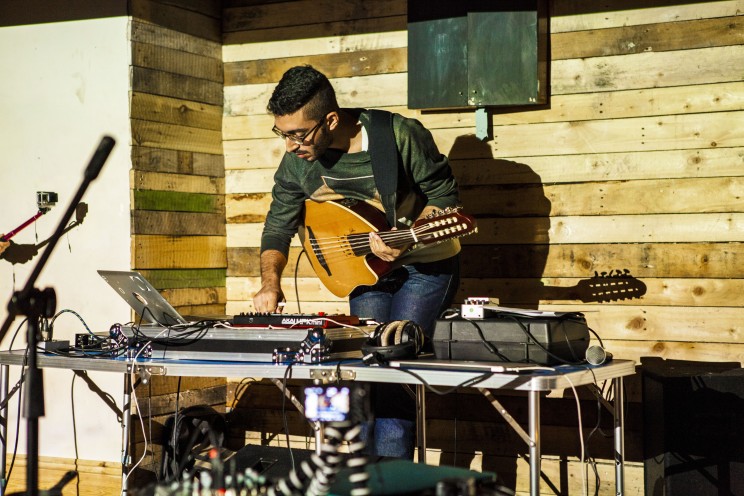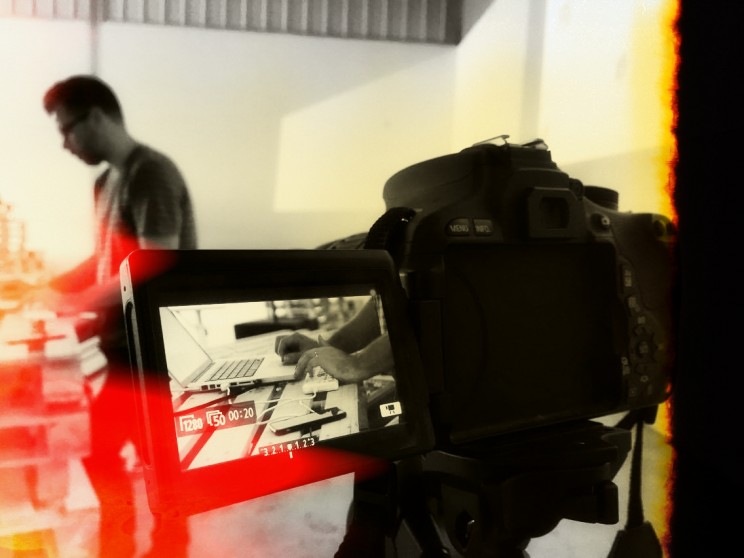![Kumah and Simon Coates live in Dubai - credit - Haya Al Tamimi [Cyanotype]](https://iklectikartlab.com/wp-content/uploads/2017/07/Kumah-and-Simon-Coates-live-in-Dubai-credit-Haya-Al-Tamimi-Cyanotype-e1499954528302-744x419.jpg) Simon Coates & Kumah live in Dubai, photo by Haya Al Tamimi.
Simon Coates & Kumah live in Dubai, photo by Haya Al Tamimi.
Simon Coates is an artist, writer and curator. He is the founder of Tse Tse Fly Middle East, a multi-disciplinary platform for artists, musicians and sound makers with connections to the Middle East, Africa or the Indian subcontinent.
Established in Dubai in 2015, Tse Tse Fly has thrived as the region’s “first ever sound art and experiments-in-noise” club night and provided an alternative to the city’s night time economy. Artists who have performed at Tse Tse Fly events include Nour Sokhon, Karim Sultan and Jonny Farrow. A compilation album of participating artists, Easy Listening Vol. 1, was released by Must Die Records in 2016.
Having curated events in Dubai, Sharjah and the UK, Coates is now looking to expand Tse Tse Fly into “a social enterprise that wants to use its profits and assets for the public good”, highlighting civil rights issues in the Middle East and elsewhere. Due to strict censorship laws and the conservative nature of the United Arab Emirates (UAE), Coates’s non-profit, pro-human rights organisation could only establish itself in earnest upon his relocation to London in June 2017. IKLECTIK caught up with him to find out more about his work with Tse Tse Fly.
IKLECTIK: What was the club scene like in Dubai before you began operating as Tse Tse Fly and how did you go about sourcing sound artists if there wasn’t already a platform for them?
Simon Coates: The club scene is very healthy in Dubai, if you’re a fan of commercial house and techno. In fact, there are club nights that wear their commercial house badges with pride. If the Dubai club scene was a plant it would be Japanese knotweed. It is sprawling and suffocates anything new sprouting in its path. Tse Tse Fly Middle East was born, in part, out of sheer frustration. My friends and I really didn’t have anywhere to go so, in true Garland and Rooney style, I decided to put something together where we could meet and share ideas.
I was also very interested in subverting traditional club tropes. As part of my own practice I look at creating intangible work, so the club nights helped satisfy that inasmuch as they existed and they are now over. As there are no grassroots art publications in the UAE we ended up advertising the nights via club listings so we really were cheek by jowl with tech house nights and PAs from Nicky Minaj.
As you can imagine, this led to a few misunderstandings as people would rock up expecting what is a normal Dubai club night only to be confronted by these people hunched over laptops making one hell of a noise. One guy who came along was so appalled he asked us to refund his Uber fare. We didn’t. In terms of sourcing artists, to start with, I asked a couple of friends to perform at the nights. I then realised that it would be boring to have the same people over and over again so I contacted a handful of other people that I knew had an interest in sound and asked them if they’d like to get involved. One of the best parts of the whole project was that a few people who had come along as members of the audience ended up asking if they could join in. We ended up with a loose collective of around nine people that had developed almost completely organically.
Karim Sultan performing at Other Worlds Festival (2016), photo by Manon Bajart.
What was the local response to this collective? Did you develop a reputation?
It might sound slightly cynical, but we knew that what we were doing was so different that people would either come along out of curiosity or just not come at all. That said, our first event was packed. We’d done a pretty good job on putting the word out, but that also meant that we had a load of arts professionals come along. One of our initial intentions was to make sound art and experimental music accessible to everyone and to take it outside gallery and institutional walls. Art-wise, Dubai is very commercial. The city has more than forty galleries and they’re all built on sales models. This means that there are a lot of people in Dubai that work as cogs in the commercial art wheel and it felt like a good amount of them had turned up on the first night. They didn’t turn up for the second night, though.
It actually became a kind of motto for us that we’d rather have a few people coming along that wanted to be there than a load of people looking for the next bandwagon. On our most badly attended night we actually outnumbered the audience. Our best attended event was our album launch party last September. It just felt like all the planets were aligned for us. During that afternoon, when we were setting up, we were talking about American zines from the 1980s that we’d found online and how they were the perfect archive for what was going on back then – hand-made, cut and paste jobs with articles and interviews with people like Boyd Rice, Cabaret Voltaire, Whitehouse and so on. Then someone said that, one day, people might look back on what we were doing with Tse Tse Fly and see it as a kind of touchpoint. I think that helped the penny drop for us. The sheer fact that we were doing this at all drove home the fact that the size of our audiences and other reactions didn’t really matter.
As far as reputations go, I think we gained a reputation for not compromising. We have dipped our toes into the mainstream by working with a couple of the established art organisations in the UAE, but that was only because they had made the effort to come to our events more than once. They also tried to engage with us and to genuinely understand what we do. On the other side of that coin, Art Dubai contacted us when we first started, asking if we could do something with them. We didn’t, simply because that would have been surrendering. Sadly, there just isn’t the support or understanding for something like Tse Tse Fly in the UAE. People aren’t used to the DIY approach. It’s like handing someone a hot potato – they juggle it around for a bit and then offload it to someone else, but I have to admit that I quite liked that.
I remember we did one event in a warehouse and a guy was walking past. He stopped dead in his tracks and asked me: “Is someone playing Coil in there?”. I said it was actually Black Line, one of our members playing a live set. The guy just stared at me and said, “I never, ever expected to hear anything like this in Dubai”. It’s interesting that we get a lot of interest from overseas, hence us taking part in the 2016 Other Worlds Festival in Blackpool and showing our work at the FAS Festival in Kurdistan this April.
 Nour Sokhn live in Dubai, photo by Haya Al Tamimi.
Nour Sokhn live in Dubai, photo by Haya Al Tamimi.
How do you envision carrying the project forward from the UK and what everyday realities do you foresee operating Tse Tse Fly as a Community Interest Company?
I think the fact that Tse Tse Fly has grown from a distraction into something more substantial means that it deserves to develop even further. It’s been a challenge managing Tse Tse Fly in Dubai because there are a number of restrictions.
For example, the government has to give their permission for every event that takes place in Dubai and this costs money. Then there is a government fee for everyone who performs at the event. Then there’s a processing fee. Each performer has to also submit a copy of their passport, visa and a photo. We didn’t charge an entrance fee for our events but, if we had, we would have had to pay the government 10% of each ticket sold. Obviously we don’t have those hoops to jump through in the UK, so just putting on Tse Tse Fly events will be much easier.
It’s also very difficult to set up an organisation in Dubai, because any kind of company must be part-owned by an Emirati who automatically gets 51%. This is a legal requirement. Again, we don’t have that issue in the UK. In fact, the Community Interest Company model was created specifically for people who wanted to create something for the good of the community. So, Tse Tse Fly Middle East will become a Community Interest Company that supports sound artists and experimental musicians with roots in the Middle East, Africa and the Indian sub-continent, as well as providing a platform for charities and organisations that highlight issues in those regions.
When I was a kid I remember seeing posters for gigs where the line-up would feature acts like Benjamin Zephaniah, the Poison Girls, Attila the Stockbroker all side-by-side. I think that it’s time to re-capture that spirit of collective consciousness with common aims. Tse Tse Fly live events in the UK will feature films, speeches and literature – as well as performances from sound artists and experimental musicians – and the platform will be made available to organisations like Artists For Palestine UK, Human Rights Watch and 28 Too Many (that campaigns against FGM), for example. These are the kind of groups that don’t just represent what’s going wrong in the Middle East, India and Africa, they represent ongoing basic international human violations.
Black Line live in Dubai, photo by Haya Al Tamimi.
You mentioned in the press release that your “six-year tenure in Dubai has turned me into a kind of pressure cooker”. Can you give details of your experience of the human rights, gender, inequality and/or opportunity issues in the UAE? In what way do these hinder the creativity and productivity of the collective?
It’s genuinely depressing answering a question like this. In the six years I’ve lived in Dubai I’ve visited some amazing places. In fact, there are parts of the UAE that now count among my favourite places in the world. I’ve also met some brilliant people, some of whom will be firm friends forever. Dubai has helped me realise that the UK can be an arrogant, self-centred place and that the UK’s colonial ambitions and diplomatic decisions have caused deep-seated problems that persist today.
The UAE is rightly accused of a lot of things. Things that the UK has been guilty of in the past too. The depressing thing is that, for all of this, try as I might I simply cannot excuse the region for allowing human beings to be treated in such inhumane ways. The son of a Sri Lankan woman whom I know was arrested and imprisoned for not paying his credit card bill, which is a crime in the UAE. English is the woman’s second language and all the arrest documents were in Arabic, but she worked for weeks to free her son. The woman works as a cleaner, sending as much money as she can back to her family in Sri Lanka. She paid for a solicitor herself and acted as a go-between, visiting the solicitor’s office and the police.
Eventually her son was freed, but the worst thing, she told me, was there were scores and scores of others still in prison with no one on the outside to help them. What happens to them? There are too many stories like this, but I think it’s also important to remember that it’s easy to criticise and hubris is always close.
Working as an artist in the UAE the mantra of respecting local culture and social mores is indoctrinated throughout pretty much everything produced, to the extent that you automatically behave. That’s quite frightening. This means you know not to create anything that’s contentious or potentially offensive as a matter of course. When I first arrived, someone who had been in Dubai for a while told me they thought this was a good thing as it forces artists to find subtler ways of getting their point across. It isn’t and it doesn’t.
Nor do I get the people who pretend that everything in the UAE is fine. There’s a certain type of person – working in the arts, in my experience – who lives outside of the UAE, criticises the hell out of it in private and yet keeps coming back when there’s cash waved in front of them or there’s a party to attend. Seeing these air kissers and arse kissers jetting back and forth when it suits them best is nauseating.
My six years in Dubai turned me into a pressure cooker because I’ve not been able – or been allowed – to communicate what’s going on in a clear and satisfactory way. I think people need to know the truth about what goes on in these regions so that they can make informed decisions and developing what’s been achieved already with Tse Tse Fly Middle East seems a logical way to get people’s attention.
João Menezes live in Dubai, photo by Mckie Alvarez.
Were there any other reasons for moving Tse Tse Fly out of the UAE?
Running parallel to the Tse Tse Fly project has been my own uneasiness and indignation about living in the Gulf region. However, because of the UAE’s conservative nature and strict censorship laws there is no way I can express those feelings and voice my views without being exposed to some kind of punitive measure.
I should stress that this is only my opinion, but it seems a natural progression for Tse Tse Fly to develop and to stand for something else aside from noise, and I can only really add the social and political angles back in the UK where there’s freedom of speech. I’ve been researching the Rock Against Racism movement for another project and what I want to achieve next with Tse Tse Fly has partly been inspired by how Rock Against Racism used music to get their message across.
There is also another dimension to this. When I first moved to Dubai friends in the UK and the States would ask me how can I live in such a suppressive, conservative environment? Six years later, the irony is that I can say the same to them. It’s obvious that the world has been turned upside down in the West, over the past few months, so if we can highlight just how upside down things are in other regions then, hopefully, that will galvanise people into doing something about it.
Tse Tse Fly will be hosting an evening of performances, screenings and a Q&A on Saturday 9 September at IKLECTIK. More details here. For more information about Tse Tse Fly visit their website or tune into their monthly radio show on Resonance Extra.





